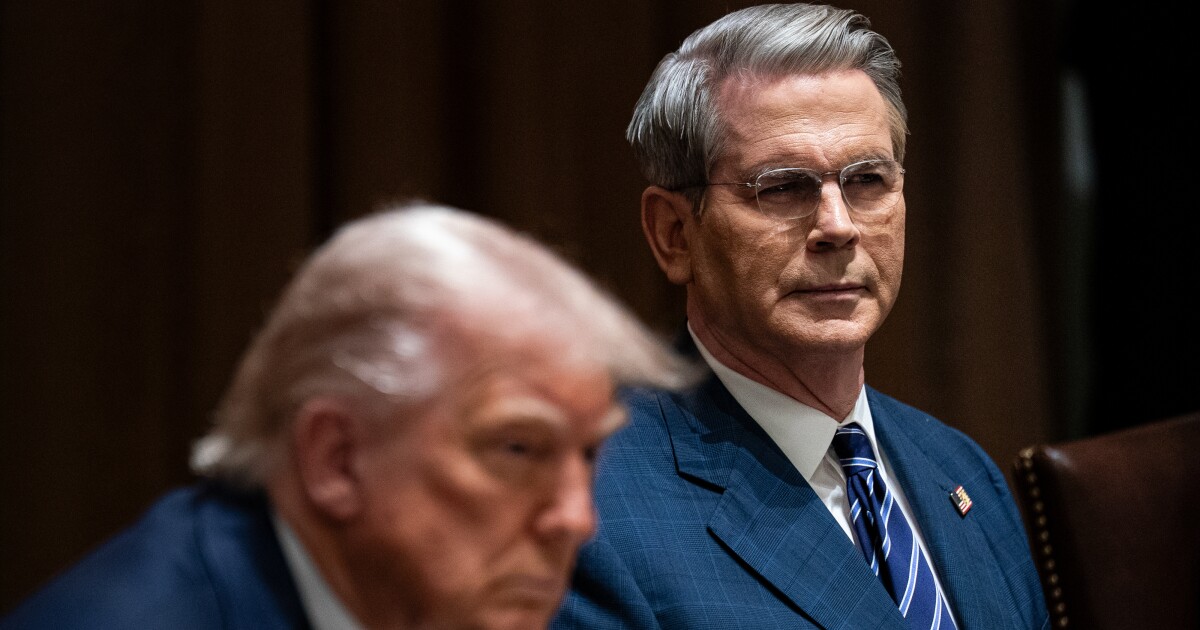President Donald Trump suggested Sunday that his sweeping tariffs would help him reduce income taxes for people making less than $200,000 a year, as public anxiety rises over his economic agenda.
Trump has previously argued that tariff revenue could replace income taxes, though economists have questioned those claims.
“When Tariffs cut in, many people’s Income Taxes will be substantially reduced, maybe even completely eliminated. Focus will be on people making less than $200,000 a year,” he said Sunday on his Truth Social network.
Trump’s tariff stances have roiled markets, led to fears of higher prices for Americans, prompted recession warnings and sparked bouts of concern about the U.S.’s haven status — a fear that Treasury Secretary Scott Bessent questioned in a Sunday interview.
“I don’t think that this is necessarily losing confidence,” Bessent said on ABC’s This Week. “Anything that happens over a two-week, one-month window can be either statistical noise or market noise.”
Trump’s administration is “setting the fundamentals” for investors to know “that the U.S. government bond market is the safest and soundest in the world,” he said.
“We’re going to make a lot of money, and we’re going to cut taxes for the people of this country” through income from tariffs, Trump said on his way back to Washington from his golf club in New Jersey. “It’ll take a little while before we do that,” he added.
For now, a CBS News poll released Sunday said 69% of Americans believe the Trump administration wasn’t focused enough on lowering prices. Approval of Trump’s handling of the economy in the poll declined to 42% compared with 51% in early March.
Trump wants to extend reductions in income taxes that were approved in 2017 during his first presidency, many of which are due to expire at the end of 2025.
He also has proposed expanding tax breaks — including by exempting workers’ tips and social security earnings — while slashing the corporate tax rate to 15% from 21%.
Trade deals
Bessent said the administration is working on bilateral trade deals after Trump imposed so-called reciprocal tariffs on many countries in early April, which he subsequently paused for 90 days for all affected countries except China.
The effort involves 17 key trading partners, not including China, Bessent said on ABC.
“We have a process in place, over the next 90 days, to negotiate with them,” he said. “Some of those are moving along very well, especially with the Asian countries.”
Bessent reiterated the administration’s argument that Beijing will be forced to the negotiating table because China can’t sustain Trump’s latest US tariff level of 145% on Chinese goods.
“Their business model is predicated on selling cheap, subsidized goods to the U.S.,” Bessent said “And if there’s a sudden stop in that, they will have a sudden stop in the economy, so they will negotiate.”
Trump has said the U.S. is talking with China on trade, which Beijing has denied. Bessent said he didn’t know if Trump and Xi had spoken.
He said he saw his Chinese counterparts when the world’s financial officials gathered in Washington last week “but it was more on the traditional things like financial stability, global economic early warnings.”
Bessent said he thinks there is a path forward for China talks, starting with “a de-escalation” followed by an “agreement in principle.”
“A trade deal can take months, but an agreement in principle and the good behavior and staying within the parameter of the deal by our trading partners can keep the tariffs there from ratcheting back to the maximum level,” he said.
In Congress, the framework for a bill that Republicans agreed on in early April would allow for as much as $5.3 trillion in tax cuts over a decade. Trump trade advisor Peter Navarro has suggested Trump’s tariffs will generate more revenue than that, while most economists project that they will bring in significantly less.


 Accounting1 week ago
Accounting1 week ago
 Finance1 week ago
Finance1 week ago
 Economics7 days ago
Economics7 days ago
 Finance1 week ago
Finance1 week ago
 Economics1 week ago
Economics1 week ago
 Economics1 week ago
Economics1 week ago
 Personal Finance5 days ago
Personal Finance5 days ago
 Economics5 days ago
Economics5 days ago












